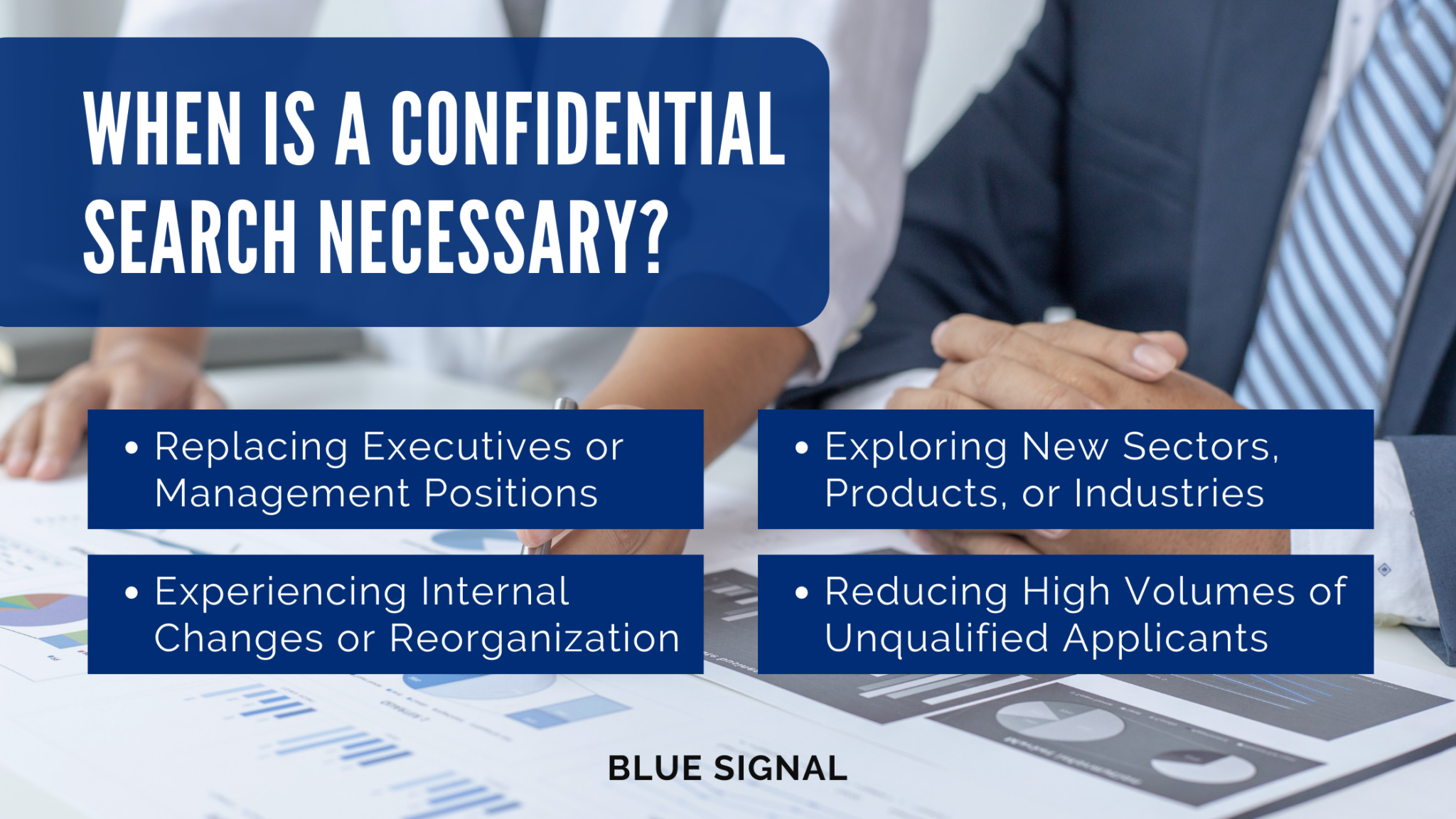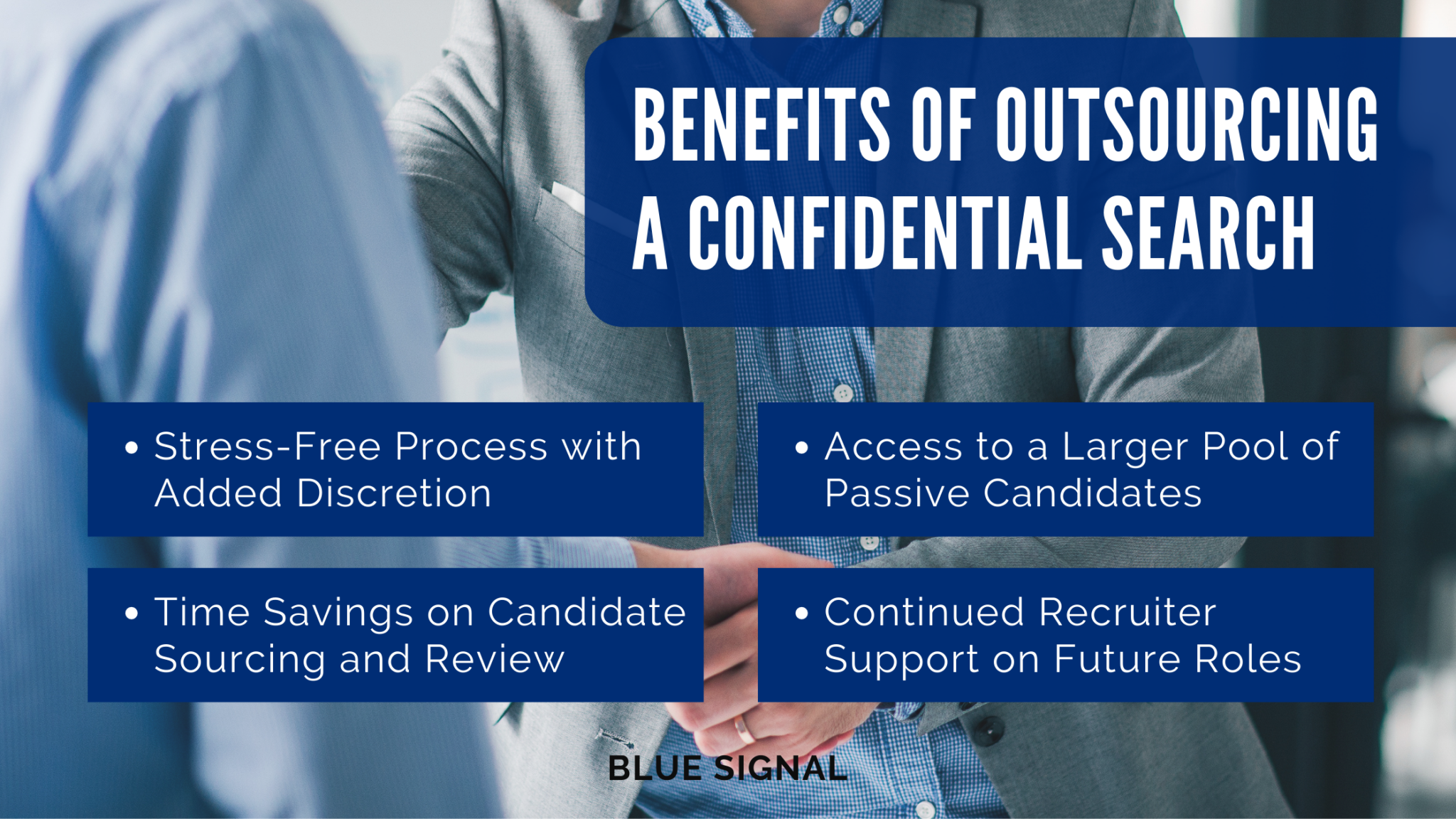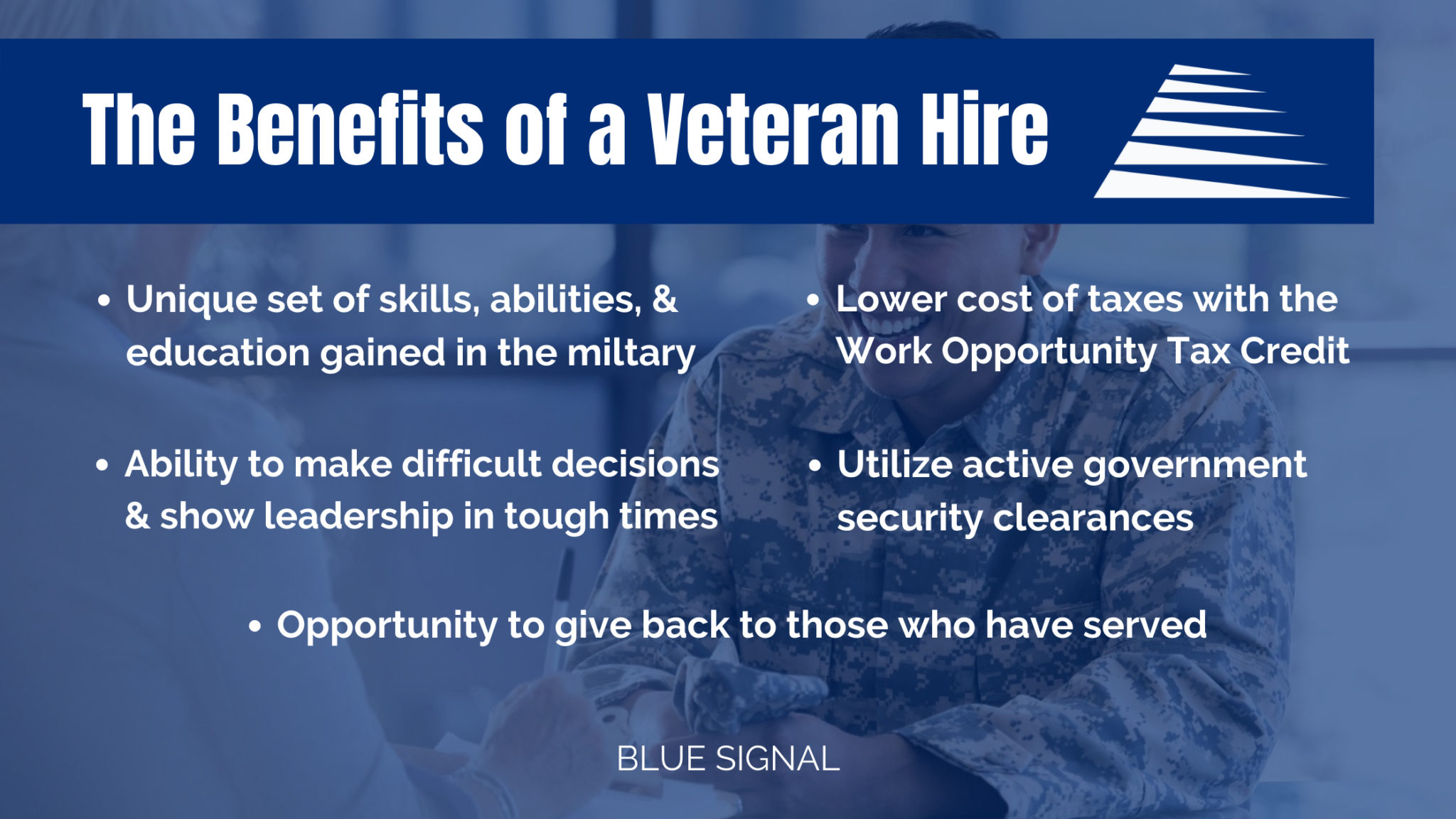According to CNBC, 70% of jobs are never published publicly – and a large part of this number comes from jobs filled through a confidential search. When filling any position, there are many things for a hiring manager to consider. The first, and most important decision, should be whether the job needs to be posted publicly or kept confidential throughout the search process. When it comes to conducting a confidential search, there are many factors that make hiring more tedious. Because of this, most companies choose to outsource these roles to recruiting firms experienced in this type of search.
But what is a confidential search? When is it necessary? And why should you look to recruiting firms to conduct them? In this blog, we’re diving into all the instances when a confidential search is important and the benefits of partnering with a trusted recruiter for these types of roles.
What is a Confidential Search?
A confidential search is when a company is seeking to fill a position without advertising or alerting their employees, competitors, and/or clients that the job is open. When choosing between a traditional search and a confidential search, there are a few simple factors that determine which is needed. How you’ll advertise the role, how you’ll source candidates, the urgency of filling the position, and of course, the level of confidentiality desired, all should be considered.
Whether a position is vacant, newly created, or replacing a current employee – conducting a confidential search could be essential. When filling a confidential search, companies can’t carry out typical advertising and job postings online like they usually would. This results in much more time sourcing candidates in a more hands-on and direct way. Even without typical job postings live online, keeping an open position confidential can still be difficult to do for an internal talent acquisition team if not experienced.

When is a Confidential Search Necessary?
Replacing Executives or Management Positions – Avoiding Leadership Gaps
The most common reason companies choose to conduct a confidential search is when they’re replacing high-level positions in leadership. Based on a recent LinkedIn poll we did with our followers – 70% of hiring managers agreed that they conduct a confidential search when replacing an executive-level role. When planning to replace a current employee, especially one with a high level of responsibility, it’s better if they aren’t tipped off about the change before coverage has been arranged. Ideally, you’ll have a replacement lined up and ready to step in when the time comes, avoiding any gaps in leadership.
In general, the process of filling executive and senior management roles take longer than lower level roles. According to Monster, the average time it takes to fill an entry- to mid-level role is about eight weeks, while a high-level role can take anywhere from six months to a year. This makes it even more important to ensure the position isn’t left empty, when possible.
Exploring New Sectors/Products/Industries
Another common reason hiring managers choose a confidential search is when their company is rolling out a new product line, business model, secondary company, etc. In most cases, it’s important to keep industry competitors in the dark about upcoming expansion news until the public launch date. Posting detailed job openings that obviously allude to new product development, sector expansion, or a first-of-its-kind service, can lead to increased market competition. When looking to launch any type of industry disruption, being first to market is key when filling a need or service gap. No matter the industry, every company has competitors, and you never know who’s keeping a close eye on you as competition.
Experiencing Internal Changes or Reorganization
Companies going through drastic internal changes such as mergers, IPOs, or restructuring may want to keep certain open positions quiet. Often, these situations can be sensitive information when it comes to internal staff. If you have not made the big announcement yet, posting certain job titles may give it away. The last thing a company needs when going through an organizational change is panicked employees – which can often lead to early resignations. In these situations, a confidential search can also ensure you’re not deterring candidates from applying. Outsiders may see these changes as the company being unstable and would result in less of an applicant pool to choose from.
For the same reason, you also don’t want to put off your clients by the amount or type of jobs you have posted online. This can be especially true for executive level roles. Even if a current employee in leadership is retiring and aware of the hiring need, it still might be a good idea to fill their role confidentially to avoid clients questioning internal stability. Many companies also need to consider their competitors in this same situation. If competitors see a time of weakness for your business, they may begin to pose a bigger threat and possibly poach your customer base.
Reducing High Volumes of Unqualified Applicants
When it comes to a globally recognized brand name or commonly sought after company, it’s always better to hire confidentially. This helps avoid receiving an overwhelming number of unqualified applicants to sort through. If a role is going to be highly desired among a large group of candidates, (i.e., a sales executive at a Fortune 500 company) you can expect hundreds or even thousands of applicants. With such a large number of applicants, it’s likely only a small percentage will be fully qualified for the position.
Conducting a confidential search also helps to avoid candidates from adjusting and falsifying experiences and skillsets on their resume before they apply. Unfortunately, this can be a common occurrence and if you’re not familiar with the signs of a candidate exaggerating during interviews, it can lead to a bad hire – meaning the search process has to begin again. When a candidate connects with a recruiter, they are asked to present a resume before they are even sent the job description. This helps ensure you’re getting an accurate representation of the candidates’ authentic experiences.

Benefits of Outsourcing a Confidential Search
Stress-Free Process
Overall, partnering with a recruiting firm ensures a stress-free environment for you and your staff. As mentioned, one small mistake can void confidentiality all together in a job search, causing a stressful hiring process for you and your internal hiring team. When using a recruiter who is experienced in confidential search, you can be confident that the position will be filled the right way.
Not to mention, an extra layer of confidentiality can be put into play when recruiters use NDAs in their search process. This is something Blue Signal does with 100% of our candidates. Having candidates sign NDAs before moving forward in the interview process and discussing company information is a great safety net to ensure confidentiality. Signed NDAs hold candidates accountable, so they don’t communicate any details related to the job opportunity with others. Recruiters also can guarantee an exclusive list of candidate outreach, so the info doesn’t get into the wrong hands. This is done by sourcing passive candidates rather than posting detailed job descriptions on online job boards.
Larger Candidate Pool
Because confidential searches are made primarily through passive candidates you can guarantee a much larger candidate pool, but without the added time screening unqualified candidates up front. Passive candidates are people who aren’t necessarily looking for a job change. They are thriving in their current role, which means regular job posts don’t typically reach these top performers. Recruiters can reach out to passive candidates directly and communicate the opportunity on a personal level. Through these one-on-one conversations, they’re able to relay certain aspects and details about the role that may pique their interest in making a move.
Save Time
Overall, facilitating a confidential search requires much more time to source and review talent. Studies have shown that 44% of candidates don’t receive feedback from a potential employer for weeks after applying. Not to mention, tests have found that the average hiring manager looks over a resume for only six to seven seconds. When working with a recruiting firm, especially on a confidential search, they are able to get back to candidates FAST and take the time to review each resume in full detail.
Recruiters also take on the added inconvenience of conducting initial candidate screenings and phone interviews. This allows them to fully vet candidates for your role before their resume even comes across your desk. Not to mention, the candidate will be fully briefed on the confidential aspects of the role and meet with you only after signing an NDA. This then allows you to interview candidates in detail without the stress of exposing sensitive company information.
Continued Recruiter Support
One of the most beneficial reasons to work with a recruiting firm during a confidential search is the overall partnership you receive along the way. Throughout the process, you’ll have the opportunity to gain expert-level advice, learn about best practices, and get questions answered by your recruiter. Once your recruiter identifies a great candidate, your partnership doesn’t end after the candidate’s first day. Recruiters are industry experts, and they are there to act as a partner for you and your company’s goals long-term. A great recruiter will offer support throughout new hire onboarding processes and candidate retention. Furthermore, once your recruiter understands your company’s goals, they can keep you in mind when another ideal candidate comes along in the future.
Conclusion
In the end, a confidential search done in partnership with a best-in-class recruiting firm will protect your team, brand, and drive authentic alignment with your hires. Blue Signal keeps 100% of our searches confidential, regardless of the type of search our clients choose. This helps us better protect the hiring manager’s time, gives us an exclusive candidate pool, and allows access to our own audience – which is wider than theirs on their own.
It’s important to remember, confidential searches can be much more difficult for non-experienced hiring managers. Don’t risk it – a minor slip up can cause a snowball effect and blow confidentiality fast. This is why we always recommend getting help from an experienced recruiting firm for all confidential searches. If you’re ready to partner with an expert or want to learn more about our search processes, reach out to us and we’ll connect you with a recruiter who is specialized in your industry.







 Top candidates know they are highly sought-after. They are regularly approached by recruiters or head-hunters and rarely apply to open jobs. Do not treat them as any other applicant; roll out the red carpet.
Top candidates know they are highly sought-after. They are regularly approached by recruiters or head-hunters and rarely apply to open jobs. Do not treat them as any other applicant; roll out the red carpet. The interview area will give the candidate a reasonable expectation of the company’s work environment. Candidates intentionally put themselves in hyper-observant mode and notice everything. Take a walk along the route an interviewee would take through the building, and observe the surroundings through their eyes.
The interview area will give the candidate a reasonable expectation of the company’s work environment. Candidates intentionally put themselves in hyper-observant mode and notice everything. Take a walk along the route an interviewee would take through the building, and observe the surroundings through their eyes.
 Candidates hear actions, not words. A prompt, efficient hiring process is evidence of the speed of daily business within the team. The most sought-after candidates stay busy. Time is money for candidates as well as for companies, and the time investment for a full interview cycle represents a substantial opportunity cost for them.
Candidates hear actions, not words. A prompt, efficient hiring process is evidence of the speed of daily business within the team. The most sought-after candidates stay busy. Time is money for candidates as well as for companies, and the time investment for a full interview cycle represents a substantial opportunity cost for them.